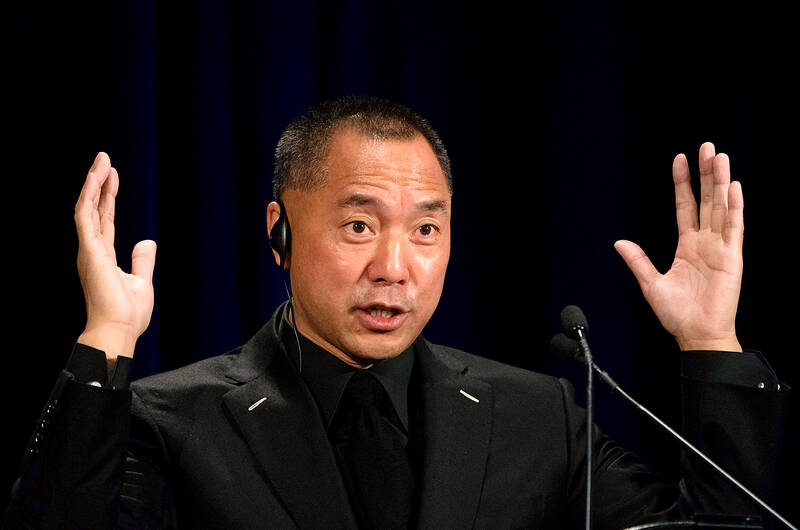A fugitive Chinese billionaire plans to auction “unvaccinated sperm” on an online platform rife with misinformation — a sale that vaccine skeptics bill optimistically as a chance to buy the “next Bitcoin.”
The sales pitch that sperm from uninoculated men will be in high demand — and therefore fetch top dollar — stems from the widely debunked conspiracy theory that COVID-19 jabs cause mass infertility.
Guo Wengui (郭文貴), a tycoon exiled in the US who was recently arrested for alleged fraud, is putting that pitch to the test with his much-hyped auction slated for June on the fringe platform Gettr.

Photo: AFP
“Sperm and eggs from our fellow fighters will be auctioned on our Gettr platform between June 1 and June 6,” Guo said in a livestream in February.
The tycoon, a cult-like figure who is wanted in China and closely tied to Donald Trump’s former political advisor Steve Bannon, claimed to have already stored nearly 6,000 eggs and a “few million sperm” from unvaccinated supporters.
“We will auction off the best sperm and eggs, including of course my own sperm,” he said, adding that trading will be allowed in digital currencies and be open to all races and ethnicities.

Photo: Reuters
It remains unclear whether the auction will go ahead following the arrest earlier this month of Guo, who faces federal charges that he defrauded thousands of online followers of some US$1 billion.
But the planned sale has generated buzz on Gettr, where the tycoon’s supporters have hailed it as a “new era for humanity.”
“Giving unvaccinated sperms or eggs not only is an honorable way to gain wealth, but also will save the future of humanity,” said a Gettr post that endorsed Guo.
The post featured a photo with a hand-scrawled message: “Unvaxxed sperm is the next Bitcoin.”
‘PURE BLOODS’
“This auction plays off a broader false narrative that COVID-19 vaccines have harmed fertility,” said John Gregory, health editor at the watchdog NewsGuard.
“Anti-vaccine misinformers pushed that claim even in the face of an abundance of medical studies showing that the vaccines don’t hurt male or female fertility.”
Guo, who goes by other names including Miles Guo, himself is an adherent to the false claim.
The New Federal State of China, an anti-Chinese Communist Party lobby group created by Guo, has also repeatedly made unfounded statements such as “vaccines are a bioweapon.”
Guo’s aides are tight-lipped about the auction. When asked about it this week, a NFSC spokeswoman said to expect a response within 10 minutes, but did not reply and stopped responding to reminders.
Gettr, a right-wing social media company which the US media said was initially bankrolled by Guo, did not respond when asked whether it would allow the auction.
In his livestream, Guo vowed to make struggling Gettr the first global platform to trade sperm and eggs from unvaccinated people.
He pledged to use “scientific methods” for verification and said a letter from an attorney will be required to confirm that the traders are unvaccinated, without giving further details on testing or storage.
But some Gettr staff have expressed skepticism about turning the platform into such a marketplace, noting hurdles including legal restrictions on the sale of semen in other countries, Rolling Stone magazine reported.
If Gettr were to proceed, the platform will likely tap into the “pure bloods,” a shadowy global movement spawned by vaccine misinformation.
Wrongly asserting that COVID-19 vaccines “contaminate” the body, adherents of the movement use online forums to seek out blood, sperm and even breast milk from unvaccinated donors.
PROFIT FROM FALSEHOODS
The online chatter appears to have fueled a belief among vaccine skeptics that the sperm represents a lucrative financial opportunity.
“The real money is in unvaccinated sperm,” said a post on Gettr.
“It’s the new white gold,” it added, using the hashtag “unvaccinated and proud.”
In another sign of interest, “unvaccinated sperm available” mugs and t-shirts have gone on sale on Amazon and eBay.
Indonesia’s health ministry in February rejected a fabricated article shared on Facebook and Twitter that said the sperm of unvaccinated men “will be highly valuable in the future,” factcheckers reported.
Another social media user suggested that if a “sperm bank for the unvaccinated” ever opened, he could get rich.
“It’s only a ‘precious commodity’ if a person has bought into the false narrative that COVID-19 vaccination harms fertility,” Gregory said.
“This auction fits with an established pattern where anti-vaccine misinformers sell products to profit from their false claims.”

The unexpected collapse of the recall campaigns is being viewed through many lenses, most of them skewed and self-absorbed. The international media unsurprisingly focuses on what they perceive as the message that Taiwanese voters were sending in the failure of the mass recall, especially to China, the US and to friendly Western nations. This made some sense prior to early last month. One of the main arguments used by recall campaigners for recalling Chinese Nationalist Party (KMT) lawmakers was that they were too pro-China, and by extension not to be trusted with defending the nation. Also by extension, that argument could be

Aug. 4 to Aug. 10 When Coca-Cola finally pushed its way into Taiwan’s market in 1968, it allegedly vowed to wipe out its major domestic rival Hey Song within five years. But Hey Song, which began as a manual operation in a family cow shed in 1925, had proven its resilience, surviving numerous setbacks — including the loss of autonomy and nearly all its assets due to the Japanese colonial government’s wartime economic policy. By the 1960s, Hey Song had risen to the top of Taiwan’s beverage industry. This success was driven not only by president Chang Wen-chi’s

Last week, on the heels of the recall election that turned out so badly for Taiwan, came the news that US President Donald Trump had blocked the transit of President William Lai (賴清德) through the US on his way to Latin America. A few days later the international media reported that in June a scheduled visit by Minister of National Defense Wellington Koo (顧立雄) for high level meetings was canceled by the US after China’s President Xi Jinping (習近平) asked Trump to curb US engagement with Taiwan during a June phone call. The cancellation of Lai’s transit was a gaudy

The centuries-old fiery Chinese spirit baijiu (白酒), long associated with business dinners, is being reshaped to appeal to younger generations as its makers adapt to changing times. Mostly distilled from sorghum, the clear but pungent liquor contains as much as 60 percent alcohol. It’s the usual choice for toasts of gan bei (乾杯), the Chinese expression for bottoms up, and raucous drinking games. “If you like to drink spirits and you’ve never had baijiu, it’s kind of like eating noodles but you’ve never had spaghetti,” said Jim Boyce, a Canadian writer and wine expert who founded World Baijiu Day a decade